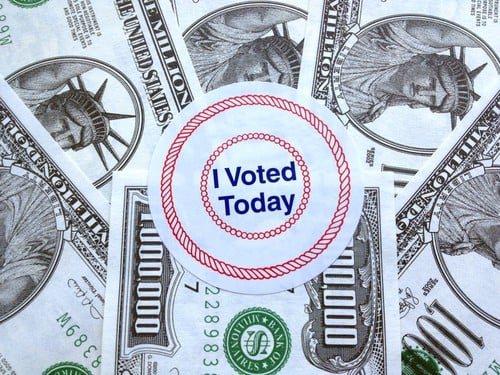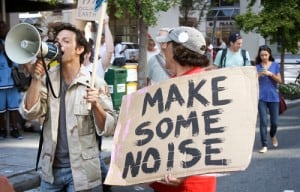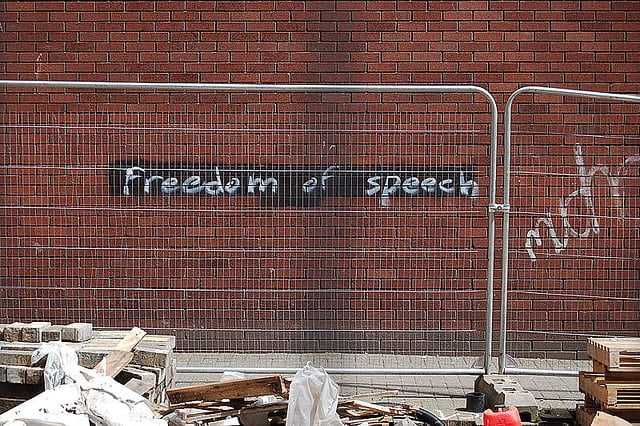In my first ever graduate class in philosophy, my professor encouraged us to link our studies to our real-world interests and experiences. Perhaps she recognized that, being a group of Jesuit scholastics, few of us saw philosophy as a dominant path through life. Or perhaps she just felt we were a bit listless after a few weeks of studying dead Greeks. Either way, I took the bait and began thinking about how the subjects we covered intersected with interests and ideas I had encountered in the study and practice of law.
So, I ended up writing a paper comparing the approaches of Plato and the American law on the issue of speech. Plato’s concern was with creating a just and virtuous society. Public expression — speech, music, theatre — needed to be censored to support that end. It was a fairly pessimistic approach.
American courts could be said to be more optimistic. They have supported a broad protection for all sorts of speech. Vulgar, offensive, odd, pornographic, even hateful speech is given at least some protection. American judges champion the ability of individuals to weigh speech and other forms of expression, to balance ideas, and to come to their own decisions about worth.
I’ve been thinking about this paper quite a bit recently. While I would hardly support a broad national censorship regime, I have often wondered if we are perhaps too optimistic, too enamored of the ability of good speech to win out over bad. This all came to a head recently when the Supreme Court handed down its split and quite controversial decision in McCutcheon v. Federal Election Commision, No. 12-536, 572 U.S. ___ (April 2, 2014).
Shaun McCutcheon supported a broad swath of candidates for office. During the 2011-12 election cycle, he donated over $33,000 to 16 candidates. He alleged that, but for limits of campaign donations, he would have donated to at least 12 more candidates. Likewise, he contributed over $27,000 to various political action committees and wanted to contribute to others, but was limited by the law. Like any good American, he sued. The Court, in a fractured and split decision,1 invalidated the caps on how many candidates and political committees any individual (including corporate individuals) can contribute to. The ruling does not affect the limits that can be given to any one candidate or committee.
Chief Justice John Roberts wrote the controlling plurality opinion. For him, the case involved the fundamental basics of constitutional democracy. He opens: “There is no right more basic in our democracy than the right to participate in electing our political leaders.”2 And financial support is participation. Thus, campaign finance limits are highly suspect. People and politicians may have good intentions in wanting to limit campaigning. Negative campaigning, the access that large amounts of money seem to buy, the need for constant fundraising — each of these can be distasteful. Yet, the Court is clear that distaste, offense, even repugnance, would not be the standard. Unpopular or offensive speech, even in the guise of campaign contributions, cannot be limited thusly.
The opinion did acknowledge some limits. Very narrow ones, though. Congress can prohibit corruption and try to limit the appearance of corruption — bribery, basically. “Any regulation must instead target what we have called ‘quid pro quo’ corruption or its appearance.”3 Everything else is nothing more than merely expressing support or disapproval.
You may notice in this too-brief synopsis that there is perhaps an odd conflation occurring. At one level, campaign limits do not seem to actually impinge on anyone’s speech. After all, no one is saying that I can’t run for Congress4, or that I couldn’t advocate on my behalf here on TJP5, and encourage all my wonderful, smart, sexy, and clearly superior readers6 to support me. And no one limited Mr. McCutcheon’s ability to support or to announce his support for as many candidates as he wanted, or to encourage others to support these candidates. And, Congress certainly did not state that only some candidates could receive contributions and that others were prohibited from soliciting or spending. The limits were simply on the amount of money that could be given and the number of candidates that you could give money to.
One may legitimately ask how giving money is speech. The plurality, and Justice Thomas in his separate concurring opinion, accept the notion that money equals speech. The Court has long held that campaign contributions are a form of speech.7 In the modern marketplace, especially the marketplace of ideas, giving money is the way we show support.
Or is it? Again, let’s be clear — the campaign rules struck down by the Court do not limit the ability to support as many candidates as desired. If you, or Mr. McCutcheon, or anybody for that matter, wanted to support every candidate of a particular political party, or every Catholic candidate, or every candidate with curly hair, nothing stops them. And if you want to tell your friends, nobody stops you. If you want to put up a webpage, or lawn signs, or publish a book, still no problems. Each of these candidates could tout your support in their campaign materials. The only limit is how much money can be given to this smorgasbord of candidates.
And it would seem that there might be good reasons to support such limits. Contemporary analysts of American culture already note with trepidation the growing levels of economic inequality. At the end of 2013, the Center on Budget and Policy Priorities released sobering statistics on trends in inequality. Newshour on PBS echoed these findings. We may not know exactly what this means long-term, but it is unlikely to be good.8
Extending this inequality into the political process seems only to be inviting problems. David Cole, writing in the New York Review of Books, pithily sums it up: “One Dollar, One Vote.” At a fundamental level, bribery is only the most explicit symptom of the problems that emerge when vast sums of money enter the political system. Money, unlike the right to vote, is not spread out equally. Elections are pricey. Thus, the ability to fund an election is a powerful tool. And it is not a tool equally accessible. What happens to those who can “only” give a vote? Their interests are drowned out in a flood of money. Not all support is created equal.
Ultimately, my critique of this decision is about perspective and scope. What is the ultimate end of free speech? Is it about finding a thousand channels of Law & Order, maybe The Golden Girls once in a while? Nice as that might be, free speech is, rather, the idea that all people have the ability to participate in the social and political community.
Indeed, the First Amendment to the United States Constitution links free speech to a free press, to religious participation, and the freedom to assemble and petition. These are distinct rights and subjects to be sure. They are, however, linked in protecting participation. No person is denied access to the social and political community.
If that end is kept in mind, then it becomes clear that money can serve to undermine the very interests that seem to justify its protection. Money is access. Unlimited money equals unlimited access. Those with less support get less access. Participation thus becomes a commodity enjoyed by those who can afford it. The Chief Justice opens his opinion with a paean to the basic and fundamental right to participate. Yet, in allowing near-unlimited sums of money into the political system, he narrows the pool of participants dramatically. The tension should be palpable.
I do not mean to imply negative motives to the Court, to the Chief Justice, or even to those who fought to strike down these limits. Nor do I mean to imply that we ought to abandon our commitment to a robust model of free speech. Rather, I suggest that our model ought to take into account the reasons we commit to such a model. Speech simply for the sake of speech is insufficient. If, instead, we are aiming to promote an inclusive model of political participation, if we aim for democracy rather than oligarchy or aristocracy, then we need an understanding of free speech that encourages participation. Such a model would focus not just on the expressive quality of money, but also on its broader role in limiting participation, encouraging a divisive inequality, and actually weakening our constitutional system.
- The Court split 4-1-4. A plurality (Chief Justice Roberts and Justices Alito, Kennedy, and Scalia) concluded that caps to the number of candidates and committees violates the First Amendment. Justice Thomas concurred, but would have ended all campaign finance limits. The four dissenters (Justices Breyer, Ginsburg, Kagan, and Sotomayor) would have upheld the limits. Since 5 justices total would strike at least the caps, those are now gone. ↩
- McCutcheon v. FEC, slip op. at 1. ↩
- Id. at 2. ↩
- Well….my Rector might be concerned. ↩
- And, yeah, the editors might not be on board….at least not until I win! ↩
- Has anybody told you just how awesome you are today? ↩
- See, Buckley v. Valeo, 424 U.S. 1 (1976). ↩
- I’ll refer the reader at this point to Jeremy Zipple SJ’s article in these pages last fall and the Frontline piece he highlighted for a dramatic exposition of the bleak prospects for the American middle class. ↩




